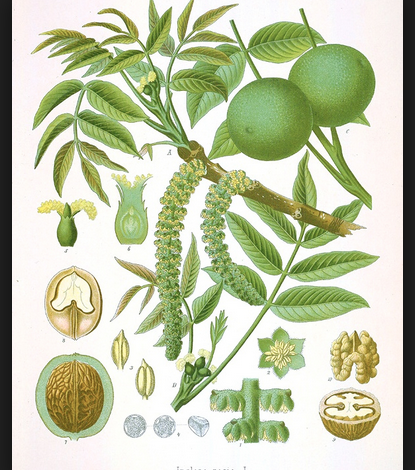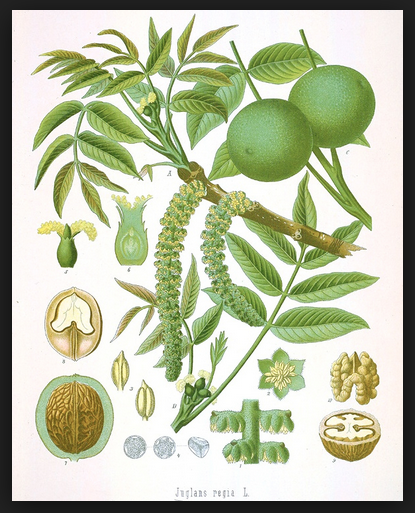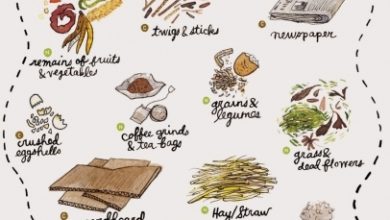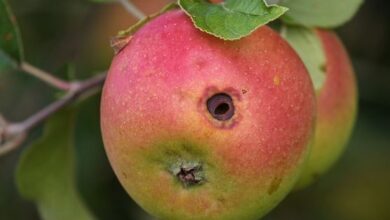Walnut: natural remedy against skin problems, infections, arthritis or stomach pain

Walnut is a plant highly valued for its therapeutic potential against different ailments that has been used in popular medicine for generations. It has been used against ailments such as diabetes, asthma, stomach pain, infections, diarrhea, skin problems, sinusitis, arthritis …
If you want to know what walnut is good for, how to use it and its contraindications, in this article we will reveal all the most important information.
What is walnut?
The Walnut ( Juglans regia ) is a tree that grows spontaneously in southern Europe, although it is cultivated in other areas of the world, such as the American continent.
The Walnut tree has a large round cup, it can reach 30 meters high and its broad leaves and its nutritious fruits are used to make home remedies for medicinal purposes.
The fruits of the Walnut are the well-known nuts that are harvested during the autumn months. These fruits are highly valued for their extraordinary nutritional value and their ability to contribute to maintaining health. To take advantage of all the properties of walnuts without the risk of ingesting harmful products that are used during their production, we always recommend opting for Organic Walnuts , for health and respect for the environment.
The leaves can be taken fresh or dried in infusion , they can be added to bath water , they can be taken in tincture , prepared in a poultice for applications on the skin and can also be used in oil .
We are going to know what the walnut is for and what its medicinal action is.
Medicinal action of walnut
It has a high content of phenols,
The bioactive components of walnut provide it with certain therapeutic characteristics. For example, we can say that walnut has action:
- Antioxidant
- Hypoglycemic
- Anti-inflammatory
- Neuroprotective
- Antifungal
- Antibacterial
- Digestive
- Anthelmintic
- Antidiarrheal
 Walnut medicinal properties
Walnut medicinal properties
- Walnut leaves have a relaxing action on the nervous system
- Helps eliminate fungi due to its antifungal power. In particular it is effective against Candida albicans.
- Relieve Conjunctivitis with Walnut Eye Baths
- Due to its astringent effect, Walnut helps fight episodes of diarrhea
- Accelerates the healing and healing of wounds on the skin
- Improves conditions of the respiratory system
- It is used to combat excess sweat
- Facilitates intestinal transit so it gently fights constipation
- The antibacterial action of Walnut leaves helps fight infections
- Walnut stimulates the proper functioning of the liver
- The oil helps to expel gastrointestinal parasites
- It is used to prevent hair loss and strengthen it
- An infusion of walnut leaves helps eliminate gases
- Being astringent it is very useful to reduce inflammation of hemorrhoids
- For mouth sores or infections, rinses are made with the infusion or with walnut oil.
- Walnut leaves help improve skin conditions such as eczema , acne , psoriasis , insect bites , etc.
- If we gargle with the infusion of Walnut leaves, we will relieve an irritated , inflamed throat and cough. Keep it handy during the cold winter.
- It regulates blood sugar levels, making it especially beneficial for people with type II diabetes and those who need to control blood sugar.
- And with regard to diabetes, there are studies that conclude that walnut has a protective effect against neurological damage caused in people with diabetes, such as the sciatic nerve.
- Walnut is a natural and effective tool to help expel intestinal parasites , being one of the most appreciated uses of this plant.
How do you take walnut?
Making an infusion with the leaves as follows:
- Place a teaspoon of the plant in a cup and fill with hot water, it does not need to be boiling.
- Cover and let stand 4 to 8 minutes
- Filter and drink little by little when the walnut infusion has cooled to room temperature.
- You can sweeten it if you want.
The infusion can be used internally, that is, simply by drinking it, but you can also use it externally by applying it to the skin in cases where you want to improve the conditions of this part.
Walnut contraindications
Like the vast majority of medicinal plants, they should not be consumed during pregnancy or breastfeeding.
Its use is also contraindicated in children under 14 years of age.
The action of medicinal plants can interfere with the effect of medications. If you are under pharmacological treatment, consult your doctor and / or pharmacist before taking medicinal plants.
This is general information, if you want to know if this plant can be useful in your case, consult a professional who can give you personalized recommendations based on your health status and needs.
Consulted bibliography
- https://www.ncbi.nlm.nih.gov/pubmed/27641607
- https://www.ncbi.nlm.nih.gov/pubmed/28969623
- https://www.ncbi.nlm.nih.gov/pubmed/24462785
- https://www.ncbi.nlm.nih.gov/pubmed/24462785
- https://www.ncbi.nlm.nih.gov/pubmed/28784433
.



![Photo of How to Prune an Avocado: [Avocado Tree Pruning Guide]](https://www.complete-gardening.com/wp-content/uploads/2021/06/sembrar-aguacates-2-390x220.jpg)
![Photo of Lavender Cuttings: [Concept, Time, Rooting and Planting]](https://www.complete-gardening.com/wp-content/uploads/2022/08/lavender-cuttings-concept-time-rooting-and-planting-390x220.jpg)